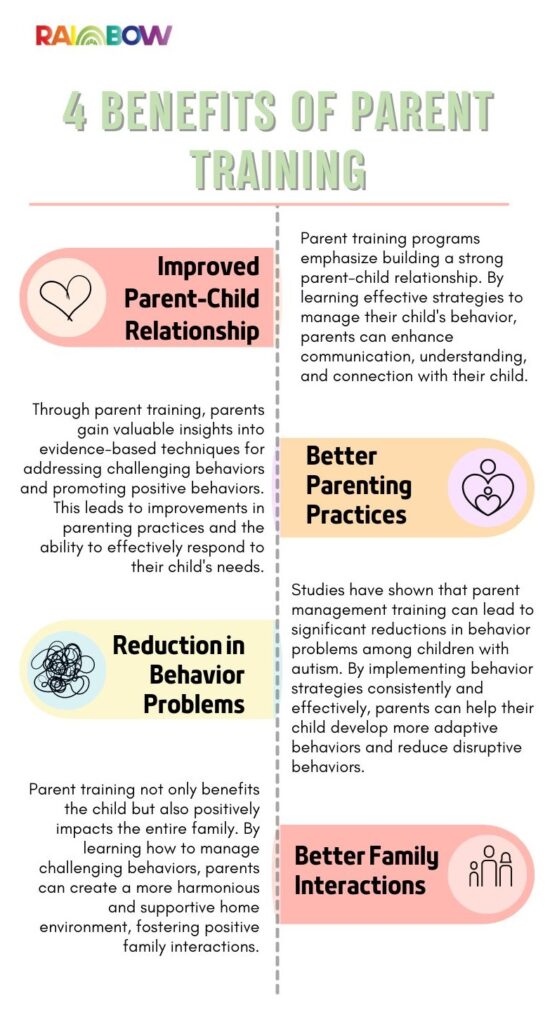
When it comes to providing effective therapy for children with autism, parent training in ABA plays a pivotal role. Parent training programs are designed to equip parents with the necessary knowledge and skills to support their child’s development and manage challenging behaviors. Understanding the importance of parent training and the benefits it offers is essential for parents of children with autism.
Understanding Parent Training
Parent training, also known as parent management training (PMT), is a behaviorally-based intervention that focuses on helping parents change their behavior to best support their child’s development. These programs teach parents effective behavior management strategies, reinforcement techniques, and methods for setting limits and implementing consequences. By providing parents with the tools and knowledge they need, parent training empowers them to become active participants in their child’s therapy journey.
Benefits of Parent Training for Children with Autism
Parent training in ABA has numerous benefits for children with autism spectrum disorder (ASD). By actively involving parents in the therapy process, positive outcomes can be achieved. Here are some key benefits of parent training:

To fully benefit from parent training, it is important for parents to actively participate in ABA therapy sessions. By participating, parents can reinforce the skills and strategies learned during training, promote generalization of skills across different settings, and ensure consistency in their child’s behavioral interventions. This active involvement and application of learned techniques are critical for successful outcomes in addressing their child’s behavioral challenges.
What Parent Training in ABA Involves
Parent training programs are designed to equip parents with the knowledge and skills to effectively address their child’s behavioral challenges. In this section, we will explore what parent training in ABA involves, focusing on teaching effective behavior management strategies, reinforcing positive behaviors, and setting limits and implementing consequences for negative behaviors.
Teaching Effective Behavior Management Strategies
Parent training programs in ABA aim to teach parents effective behavior management strategies to address their child’s challenging behaviors. These strategies help parents understand the underlying reasons behind their child’s behavior and equip them with the tools to respond appropriately. By learning how to identify antecedents (triggers) and consequences that influence their child’s behavior, parents can develop proactive strategies to prevent problem behaviors from occurring.
Through parent training, parents learn techniques such as prompting, shaping, and modeling to encourage desired behaviors in their child. They also learn strategies to manage challenging behaviors, such as using clear and concise instructions, providing choices, and implementing behavior contracts or token systems.

Reinforcing Positive Behaviors
Reinforcing positive behaviors is a key aspect of ABA parent training. Parents learn how to identify and reinforce their child’s positive behaviors effectively. Positive reinforcement offers rewards or incentives to encourage the repetition of desired behaviors.
During parent training, parents learn to use praise, verbal affirmations, and tangible rewards as reinforcers to encourage their child’s positive behaviors. By consistently reinforcing these behaviors, parents can strengthen them and create a more positive and supportive environment for their child.
Setting Limits and Implementing Consequences
Setting limits and implementing consequences for negative behaviors is another important component of parent training in ABA. Parents learn how to establish clear expectations and boundaries for their child’s behavior. Setting limits helps children understand appropriate behavior and promotes consistency in their daily routines.
When negative behaviors occur, parents are taught how to implement consequences effectively. Consequences should be logical, age-appropriate, and related to the behavior. They can include time-outs, loss of privileges, or natural consequences that occur as a result of the behavior.
By learning how to set limits and implement consequences, parents can promote appropriate behavior and teach their child valuable skills for self-regulation and self-control.
Parent training in ABA provides parents with the tools and knowledge to support their child’s development and address behavioral challenges effectively. By teaching effective behavior management strategies, reinforcing positive behaviors, and setting limits and implementing consequences, parent training empowers parents to create a nurturing and structured environment for their child. This active involvement of parents in ABA therapy has been shown to have significant benefits for children with autism, including reductions in problem behaviors, improvements in parenting practices, and enhanced family interactions.
The Role of Parents in ABA Therapy
To maximize the effectiveness of Applied Behavior Analysis (ABA) therapy for children with autism, the active participation of parents is crucial. Parent involvement plays a vital role in supporting their child’s progress and ensuring positive outcomes. Here, we will explore three key aspects of the role parents play in ABA therapy: active participation in treatment, consistent implementation of strategies, and improving the parent-child relationship.
Active Participation in Treatment

Active participation also enables parents to develop a deeper understanding of their child’s behavior and the strategies used to promote positive change.Parents then become valuable partners in their child’s progress, working alongside ABA therapists to create a consistent and supportive environment.
Consistent Implementation of Strategies
Consistency is key in ABA therapy, and parents play a pivotal role in implementing the strategies learned during therapy sessions consistently outside of therapy. By consistently applying behavior management techniques, parents reinforce the skills and behaviors targeted in therapy, helping their child generalize these skills to various settings and situations.
Consistent implementation of strategies involves using positive reinforcement to encourage desired behaviors, setting clear limits, and implementing appropriate consequences for negative behaviors. When parents consistently apply these strategies, children with autism are more likely to understand expectations and respond positively to the structured environment created at home.
Improving Parent-Child Relationship
ABA therapy not only focuses on improving the child’s behavior but also aims to strengthen the parent-child relationship. By actively participating in therapy and implementing strategies, parents can enhance their understanding of their child’s needs and develop more effective communication and connection.
Through ABA therapy, parents learn to recognize and respond to their child’s behavior in a positive and supportive manner. This improved understanding and communication can foster a stronger bond between parent and child, creating a foundation for continued growth and development.
Parents’ involvement empowers them to support their child’s development, reinforce positive behaviors, and create a consistent and nurturing environment. ABA therapy is most effective when parents are engaged partners in the treatment process, working collaboratively with therapists to achieve the best possible outcomes for their child’s growth and well-being.

Components of ABA Parent Training
Parent training plays a crucial role in equipping parents with the necessary knowledge and skills to effectively support their children with autism, particularly when utilizing ABA interventions. ABA parent training encompasses several key components, including learning ABA principles, understanding behavior functions, implementing interventions, and utilizing data collection techniques.
Learning ABA Principles
One of the fundamental components of ABA parent training is providing parents with a comprehensive understanding of ABA principles. This includes learning about the basic concepts, methodologies, and strategies employed in ABA therapy. By grasping these principles, parents can better understand how to implement behavior management techniques and reinforce positive behaviors at home.
Understanding Behavior Functions
Understanding behavior functions is another essential aspect of ABA parent training. Parents learn to identify the underlying reasons behind their child’s behavior, such as seeking attention, escaping a task, or gaining access to preferred items. This understanding enables parents to tailor interventions specifically to address the function of their child’s behavior, ultimately promoting more effective behavior management.
Implementing Interventions
Implementing interventions is a significant component of ABA parent training. Parents are taught a range of evidence-based strategies and techniques to address their child’s behavior challenges. These strategies may include reinforcement techniques, prompting and fading procedures, visual supports, and social stories. By learning and consistently implementing these interventions, parents can effectively shape their child’s behavior and facilitate skill development.
Data Collection Techniques
Data collection techniques are vital in monitoring progress and evaluating the effectiveness of interventions. ABA parent training includes instruction on how to collect and analyze data related to their child’s behavior. This may involve keeping track of target behaviors, recording antecedents and consequences, and using data sheets or visual aids. By collecting and analyzing data, parents can make informed decisions regarding their child’s treatment and modify interventions as needed.
By incorporating these components into ABA parent training, parents are empowered to actively participate in their child’s therapy and provide consistent support. Understanding ABA principles, behavior functions, implementing interventions, and utilizing data collection techniques equips parents with the knowledge and skills necessary to effectively promote positive behavioral changes in their child.

Adapting Parent Training to Individual Circumstances
Parent training in ABA therapy recognizes the importance of adapting the training to meet the unique circumstances of each family. Flexibility in training methods and ongoing support for parents are essential components of successful parent training programs.
Flexibility in Training Methods
Effective parent training programs embrace flexibility in their approach to accommodate different learning styles and family dynamics. Recognizing that every family is unique, these programs offer a range of training methods to suit individual circumstances. Some parents may prefer individual training sessions, while others may benefit from group sessions where they can share experiences and learn from other parents facing similar challenges.
In addition to the format of the training, the content and pace of the program can also be adjusted to meet the specific needs of each family. This flexibility ensures that parents can fully engage in the training process and gain the necessary skills to support their child’s development.
Ongoing Support for Parents
Parent training does not end after the completion of a program. Ongoing support is a crucial aspect of empowering parents and helping them apply the learned strategies effectively. ABA therapy providers should offer continued guidance, resources, and assistance to parents even after the formal training sessions have concluded.
Ongoing support can take various forms, such as follow-up sessions, phone consultations, or online support groups. These opportunities allow parents to seek clarification, address specific concerns, and receive guidance on implementing strategies in real-life situations. By providing ongoing support, parents feel more confident in their abilities and can maintain consistency in implementing behavior management techniques.
By adapting parent training to individual circumstances and providing ongoing support, ABA therapy providers empower parents to effectively apply behavior management strategies and create a nurturing environment for their children. This personalized approach enhances the overall success of the therapy process.

Evidence-Based Parent Training Programs
Parent training programs can be offered in individual or group settings, depending on the specific needs and preferences of the parents. Let’s explore the key components of these programs.
Individual or Group Settings
Parent training programs can be conducted either on an individual basis or in a group setting. Individual sessions allow for personalized attention and tailored strategies based on the specific needs of the child and family. Group sessions, on the other hand, provide opportunities for parents to connect with others facing similar challenges, share experiences, and learn from one another. Both formats have their advantages, and the choice between individual and group sessions depends on the preferences and circumstances of the parents.
Psychoeducation and Behavioral Strategies
Parent training programs typically involve psychoeducation, where parents learn about the underlying principles of Applied Behavior Analysis (ABA) and how they can be applied to their child’s behavior. This includes understanding the functions of behavior, reinforcement techniques, and effective behavior management strategies. By gaining this knowledge, parents can better understand their child’s behavior and develop appropriate interventions to address challenging behaviors.
Addressing Different Types of Behavioral Challenges
Children with autism may exhibit a range of behavioral challenges, including difficulties with communication, social interactions, and emotional regulation. Parent training programs aim to provide parents with a comprehensive set of strategies to address these challenges. This may include techniques for promoting communication skills, teaching social interaction, managing aggressive or self-injurious behaviors, and supporting emotional regulation. By addressing these different types of behavioral challenges, parents can effectively support their child’s development and well-being.
By equipping parents with the necessary skills and strategies, these programs enable parents to create a consistent and supportive environment for their child. This consistency helps in generalizing skills beyond the therapy setting, leading to improved long-term outcomes.
If you’re a parent of a child with autism, consider exploring evidence-based parent training programs. These programs offer a structured and proven approach to helping you effectively manage and support your child’s needs.

